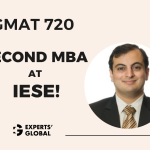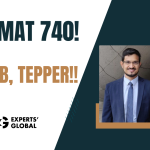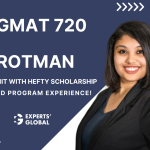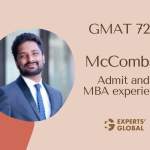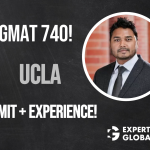Verbatim
Experts’ Global: Hi Anurag, thank you for your time today! Could you share your journey with our readers?
Anurag: Sure, and thanks for interviewing me! I was able to secure a 750 on the GMAT, with a better score in Verbal than in Quant. I got admits to NUS and the University of New South Wales, Australia, but I chose HEC Paris as my ultimate MBA destination!
Experts’ Global: During your GMAT prep, what was the biggest challenge you faced and how did you overcome it?
Anurag: In my professional life as a doctor, mathematics has not been of much use. I had not studied the subject for ten years before I started my GMAT prep. This made the Quant part of the GMAT harder for me. For applicants such as me from non-quant backgrounds, you can optimize your GMAT score by building up your weaknesses in math while making sure to consolidate your strengths in Verbal.
Experts’ Global: In your opinion, what decisions or factors enabled your success?
Anurag: Among other things, I put significant effort into getting my Quant aptitude GMAT-ready. Applicants should make sure to use the official material from the GMAT website thoroughly, and perhaps also use an additional GMAT online course. Further, practicing your concepts through multiple question banks and building your fundamentals is a good idea.
Experts’ Global: Looking back, what mistakes did you make along the way?
Anurag: I rushed into my first GMAT attempt and ended up with a 660 instead of the 700+ score I was expecting. I would advise other applicants to work on clarifying their concepts and taking GMAT mocks regularly for their benefit. Regular practice is essential for GMAT success. Especially for working professionals, it can be tough to make time for consistent studies because of their other engagements. Even so, I would advise anyone who really wants to excel on the GMAT to put in four to five hours of daily studying for the test, for a minimum of six months.
Experts’ Global: What are your views on mock testing, and what number and frequency of mocks should GMAT aspirants take?
Anurag: I would say that GMAT mocks are quite important, but that they also need to be taken at spaced-out intervals. Take a free GMAT practice test right at the beginning of your prep, and after you complete your Verbal and Quant studies respectively, take mocks that cater to the section that you have just finished. Two weeks before your actual GMAT, start taking full mocks and try attempting at least ten tests during the period. This approach will help you build the necessary test-taking stamina for the real GMAT.
Experts’ Global: How was your application experience and what things do you believe you did well therein to secure your MBA admits?
Anurag: I applied only to international schools. Regarding European business schools, I figured out that they prefer applicants with around five to eight years of work experience, and those in their late twenties to early thirties. The top American business schools appear to prefer candidates with lesser experience. My point is that applicants must do their research in-depth to figure out which school fits them best.
You must know what school offers the best admission chances and ROI for your particular post-MBA ambitions. Also, most business schools look at the entirety of your profile and not just your GMAT score to assess your candidature.
Experts’ Global: What were your lessons from managing the application timelines?
Anurag: I would suggest that applicants start working on their applications at least a year before their targeted admissions deadlines. A candidate who has their application well in hand and their wanted GMAT score secured earlier has the best chance of applying successfully in round one. Take care of your GMAT as early as you can because the score stays valid for five years. Thereafter, focus on building your profile beyond just excelling at work. Try and revitalize an extracurricular interest from your college days or work with an NGO or similar charitable organization to boost your profile.
Experts’ Global: How was your MBA interview experience?
Anurag: For most business schools, I had two interviewers of which one was an Indian MBA alum of the school. Overall, I was asked questions about my motivations for an MBA, why I chose the particular school, and what my achievements in a professional sense had been. In answering the last kind of question, it is best to focus on the impact of your work rather than narrate a triumph from your professional history.
I was also asked behavioral questions and tested on my response to certain difficult hypotheticals. However, with my MBA interview prep, I was ready for these queries and ended up doing quite well!
Experts’ Global: What is your final advice to MBA aspirants reading this?
Anurag: For the GMAT, having around six months of planned prep time is a good idea. Study daily for around four to five hours, and treat the official material as your Bible. For students from a non-maths background, focusing on consolidating their Verbal aptitude can boost their GMAT score. If you are able to bag a 730+ on the GMAT, you should get interview calls from good schools in both the US and Europe.
Regarding the application work, build your profile holistically. Try and develop authentic extracurricular interests or social impact engagements. Showcase your growth after your undergrad years as holistic, and alongside describing your promotions at work, try and address how you have evolved personally as well. Having a good MBA admission consultant, lastly, can help you figure out what schools offer you the best chances of admission!
Experts’ Global: How excited are you to begin your HEC Paris MBA?
Anurag: I am extremely excited! I am very much looking forward to my journey; it starts within the coming two months. Hopefully, it all goes well with the academic immersion and the post-program job hunt.
Experts’ Global: Thank you for the valuable information you have shared with us, Anurag!
Anurag: I hope this conversation aids other MBA applicants, as well!

